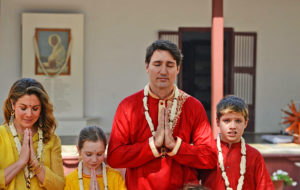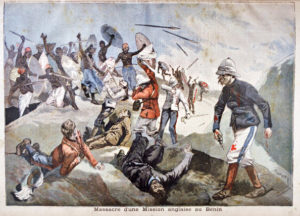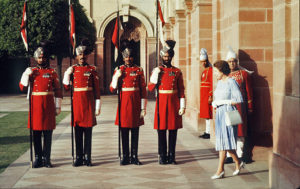“This House is ashamed to be British.” On 11 November, I spoke opposing this motion at the Cambridge Union, one of the country’s oldest debating societies. I didn’t think it was an invitation I could honourably shirk, especially on Armistice Day. I expected a big defeat. Even in the Thirties, shortly after Hitler had come to power, the Oxford Union voted that “This House would under no circumstances fight for King and Country.” How, I thought, could a “woke” generation of students, brought up on a diet of Critical Race Theory, decolonisation, and anti-Brexitism, resist the temptation to raise two fingers to national pride?
But to my surprise we won, and by a considerable majority, in a packed chamber. Not due to my halting efforts, but rather to a brilliant speech by Trevor Phillips, who evidently touched both the hearts and the minds of the large and diverse audience. He was able to draw on his family’s opposition to colonial rule in British Guiana, and yet also on his father’s patriotic service in the Second World War and his own respect for many of our country’s achievements today.
Not all students fit the “woke” stereotype that I was too ready to ascribe to them, then. Many of those present, including several who spoke, were not British; the University is today a highly international institution. And yet they recognised that our nation can and should inspire pride and gratitude.
Trevor urged the audience not to emulate their Oxford predecessors and encourage the enemies of democracy and freedom by publicly rubbishing our common culture; and he politely but firmly rebuked a young woman who proclaimed from the floor that the current Tory government was little better than a populist dictatorship. Though he had never been and would never be a Tory, he said, the present government included more people from ethnic minorities in senior positions than all the governments in our history combined, and more than any government in Europe today.
This is what our “history wars” are really about. Not analysing and understanding the past, but using historical claims to support negative assertions about the present. Despite the majority of students who voted for us that evening, I was alarmed at some of the opinions that were presented as incontrovertible fact. Two that remain in my mind are that our history had been “a long bloodbath”, and that Churchill was responsible for the Bengal famine if 1943.
I hope these were not History students, who should have known that the Bengal famine is a complex and contested episode, and our domestic history, compared with most countries’, has been relatively peaceful and bloodless. I hope that History students might also have recalled the conclusion of that deeply anti-colonialist former imperial policeman, George Orwell, that the British Empire had been “peaceful as no area of comparable size has ever been [with] fewer armed men than would be found necessary by a minor Balkan state”.
Where do (some) Cambridge students get the idea of our history as a “bloodbath”? Much recent popular writing on the empire — for example John Newsinger’s The Blood Never Dried — has emphasised its violence practically to the exclusion of all else. But for that perspective to seem plausible, it is necessary to avoid all comparisons with what existed before colonial rule, and with what, in some countries, came after it. It is necessary to draw a veil over pre-colonial societies, and imagine them uncritically either as “noble savages” living in a peaceful and ecologically sustainable Eden, or as viable modernising states. It is even more important to avert one’s gaze from post-colonial failures and tyrannies.
Instead, one has to accept the accounts of axe-grinding nationalist politicians, such as the Indian polemicist Shashi Tharoor, who in Inglorious Empire: What the British Did to India, uses the British Raj as a scapegoat for the failings of modern Indian governments. Or one has to play up to the politics of victimhood by making slavery the hallmark of the Empire — even though the Empire was the major force that suppressed global slavery during a century and a half of effort.
The “woke” fervour that has recently disturbed the cloistered calm of Cambridge is based on bad history, then. The kind one would expect of a doctrinaire first-year undergraduate, perhaps. And yet, as my pleasant and interesting evening at the Cambridge Union suggested, I do not believe that it comes primarily from the majority of students. Some of it may come from PhD students and academics in subjects such as “postcolonial literature”, for whom wokeness is practically a requirement of the job. But although they managed to bully one young academic out of his college fellowship after accusing his research of being “racist”, generally they are too few and intellectually too marginal to have an impact on their own.
The real problem comes from the University and College administrations. It is they who are encouraging, and even requiring, gestures towards “decolonisation” and the sort of anonymous denunciation that masquerades under the once innocent slogan of “Equality, Diversity and Inclusion”. It was a Pro-Vice Chancellor who pushed a now notorious anti-racist strategy that encouraged secret complaints about “microaggressions”, and which had to be withdrawn in the face of strong internal and external criticism. It is certain Colleges, notoriously Downing, that are now attempting to adopt an almost identical policy at the lower level. It was the University’s central authorities who dragged their heels over guaranteeing free speech, until forced to change direction by a vote of the academic rank-and-file in the Regent House. And it was the Vice-Chancellor, Stephen Toope, who in 2019 set up an enquiry into the University’s links with slavery, “amid a wider reflection taking place in the United States and Britain on the links between universities and slavery”.
Herein lies a clue as to what is really going on here. The university is in competition, especially with American universities, and, pretty obviously, wokeness is part of a marketing strategy. University managers are increasingly operating like any other multinational corporation. All have to “curate” their public image, and their gestures carry no more intellectual or moral weight than those of Nike or Ben and Jerry.
My own College, St John’s, has been spared the temptation of progressive histrionics: luckily, our connection with slavery is that the two greatest English abolitionists, William Wilberforce and Thomas Clarkson, were undergraduates, as were Lord Castlereagh (who secured the first international anti-slave-trade commitment in the 1815 Treaty of Vienna) and Lord Palmerston (who in 1850 sent the proverbial gunboats to Brazil to stop the largest remaining trans-Atlantic trade). It seems that the father of an 18th-century student owned slaves, but fortunately the College got none of his money.
Not so fortunate has been Jesus College, whose contortions have epitomised the worst hypocrisies of “woke”. Their embarrassing record of lucrative sycophancy towards the Chinese regime means that discussion of human rights has been regarded as “unhelpful”, and suppressed, in case the College were “perceived as being a campaigning college for freedom for Hong Kong [or] freedom for the Uighurs”. But if they show limited concern for genocide in the 21st century, they are very sensitive indeed to an investment in the slave trade by their great benefactor Tobias Rustat in the 17th. Him they are busy cancelling, to the extent of trying to remove his memorial from the College chapel. Meanwhile, the college’s China Centre, which “aims to deepen mutual understanding between China and the West by ‘using the past to serve the present’”, blithely continues.
Jesus College has also just ostentatiously returned to Nigeria a “Benin Bronze”, seized during a British punitive expedition against the slave-owning Kingdom of Benin in 1897, following the slaughter of a diplomatic mission. Of course, the college is free to donate its property as it wishes, and it could have decided, unobtrusively, that a brass cockerel from Nigeria would be more appreciated in its ancestral homeland than merely by being placed on a dinner table in Cambridge during feasts.
But instead, the college staged a fulsome ceremony, in which the statuette was handed to a descendent of the Obas of Benin, the slavers from whom it was confiscated. The British who freed the Oba’s slaves were described by the Master as having committed “a wrong that is so egregious”. Slaving by Africans, it would seem, is not worth a mention. At Jesus College, the Master added, “we teach, we educate.” It is hardly surprising if Cambridge students thereby acquire strange notions of history.
Disclaimer
Some of the posts we share are controversial and we do not necessarily agree with them in the whole extend. Sometimes we agree with the content or part of it but we do not agree with the narration or language. Nevertheless we find them somehow interesting, valuable and/or informative or we share them, because we strongly believe in freedom of speech, free press and journalism. We strongly encourage you to have a critical approach to all the content, do your own research and analysis to build your own opinion.
We would be glad to have your feedback.
Source: UnHerd Read the original article here: https://unherd.com




